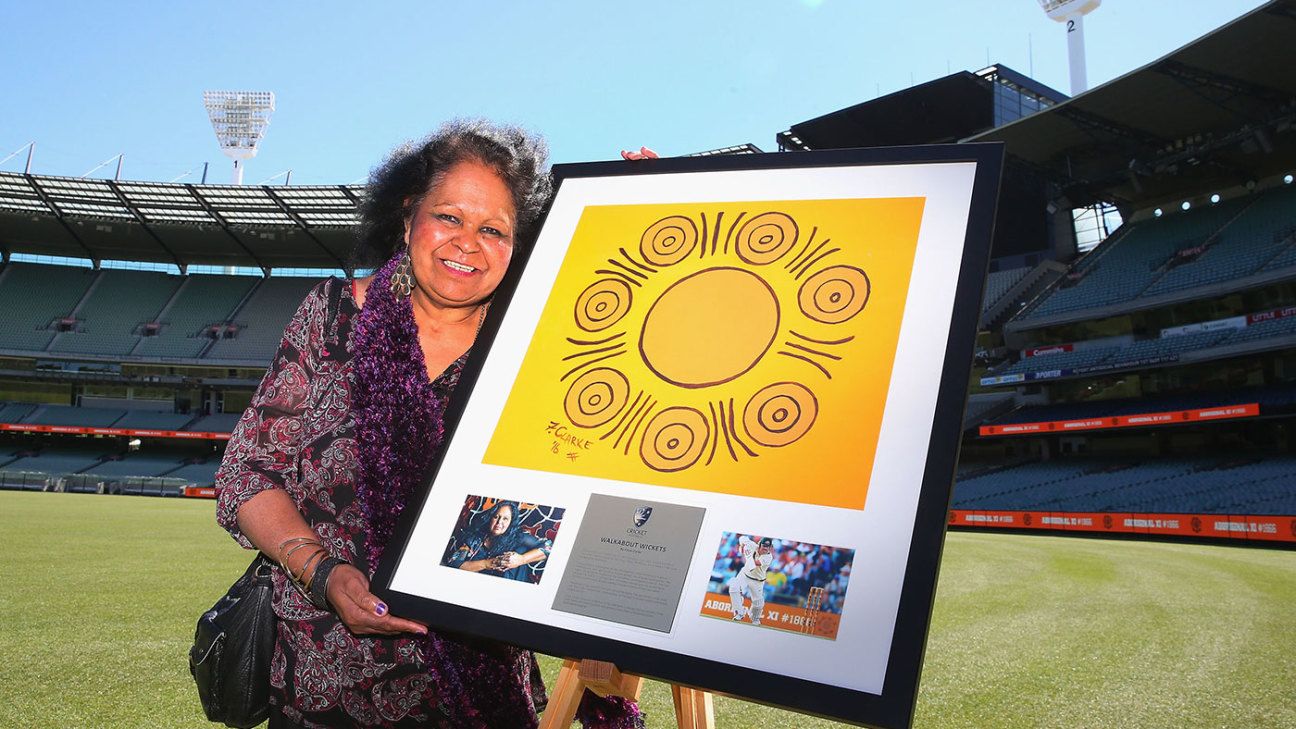
Australia's cricketers will carry a giant silk adorned with the Walkabout Wickets logo onto Allan Border Field and then form a barefoot circle with New Zealand in a major public display of solidarity with the nation's Aboriginal community prior to the first international sporting fixture on home soil since the emergence of the Black Lives Matter movement this year.
Plans for such a moment are in line with a long-running process by which the women's national team has connected ever more deeply with the experiences of Aboriginal Australians and other people of colour, but will carry added significance in the wake of the many conversations opened up around BLM. In particular, Meg Lanning's team hope to shine light on the fact there have been more than 400 Aboriginal and Torres Strait Islander deaths in custody since the Royal Commission into Aboriginal Deaths in Custody handed in its findings in 1991.
The team had previously formed a barefoot circle prior to the Reconciliation match played against England in Canberra in February, where the players also took the field wearing Indigenous-inspired playing kit. These public gestures have run hand in hand with education and connection efforts to ensure that all players and staff know the deep and often painful history of Aboriginal Australia and how its initial close connection to cricket - via the inaugural MCG Boxing Day cricket match in 1866 and the more widely known tour of England in 1868 - was lost for decades.
ALSO READ: Australian cricket's Indigenous inclusion - 'You can't just window dress things'
The Walkabout Wickets design was created by Aunty Fiona Clarke, a descendant of one of the members of the teams that played in 1866 and 1868. The logo will also feature on the collars of both the women's team, exemplifying a long-term commitment between them and Aboriginal Australia. The concept of forming a barefoot circle is based on the idea of connecting the players to the land and its traditional owners as well as to each other. It will become part of the routine for the team each time they visit a new city.
"The great thing about being involved with it was that it wasn't a superficial event," Australia's vice-captain Rachael Haynes has said of the Reconcilitation match played against England last summer. "Quite often when we do things on the field, you walk out as a player and you're just part of that one moment and then you move on and you play the game. One of the things I really enjoyed about being involved in it was it started perhaps six months before that moment.
"CA came and presented to us on the whole concept and then spoke about the jersey that was going to get produced and we did some activities leading into it as well to get an appreciation of indigenous culture. For me as a player that was much more valuable than just stepping out onto the field and going through the ceremony and not perhaps understanding different moments you were part of.
Langer accepts Holding's criticism about not taking a knee
Justin Langer accepts Michael Holding's criticism and admits Australia could have learnt more about the movement.
"I think that's something sport has a responsibility to do, just because the lights and cameras are out and flashing, that's not just the moment you're looking to capture. If you want to be impactful long term, you've actually got to take the opportunity leading in to educate the players on what they're doing and why they're doing it and what the opportunity is as well. Rather than just getting them to step out onto the field and be part of a ceremony which is really symbolic and great to be part of, but that shouldn't be where it stops and starts."
In addition to being pioneers for the professionalisation of women's cricket, the Australian team have also played a leading role in showing how an elite sporting team can expand its understanding of issues around race and inclusion beyond public actions often queried as "tokenism" without a deeper meaning beneath them.
The men's national team is at an earlier stage of a similar journey, as acknowledged by coach Justin Langer on the recent tour of England after criticism from Michael Holding for not taking the knee.
"To be completely honest we could've talked more about it perhaps leading up to that first game, there was so much going on leading up to us getting here, maybe we should've thought and talked a bit more about it," Langer said.
"What we do talk about in the team is we want to have a response that is sustained and powerful and it can go, not just in one action, but sustained periods, not just throughout this series, throughout our summer, but throughout time.
"I know there's a lot of talk going on within our group about how we can, and I know there's a lot of talking going on about the Australian women's team as well, about how we can have a sustained and powerful response to Black Lives Matter. It's incredibly important."
Ricky Ponting, the former Australian captain, stated this week that BLM and related issues needed to be the subject of plenty of conversations in cricket. "It's not just about the Australian cricket team, it's about Australian cricket and it's about the world game," Ponting told Inside Sport. "It's a huge issue in world society at this point and as cricketers we should do what we can to help the cause or around that cause. We should certainly be talking about it."















 Phone: (800) 737. 6040
Phone: (800) 737. 6040 Fax: (800) 825 5558
Fax: (800) 825 5558 Website:
Website:  Email:
Email: 






